Reformation Heritage Theology Collection (10 vols.)
Digital Logos Edition
Overview
Our theology has a profound effect on our daily Christian life—informing our actions through our thoughts about who God is. In this collection, distinguished scholars and pastors including Joel Beeke, J.V. Fesko, Thabiti M. Anyabwile, and Paul Washer offer full-bodied theological discussion that upholds historic Reformed doctrine. This collection encourages readers to take a long look beneath the surface and better understand the measureless treasure of the gospel.
Delve into important aspects of Reformed theological understanding and tradition—from gospel assurance of salvation, to being united with Christ, to the thought of past theological giants: John Owen, Franciscus Junius, and William Perkins. Immerse yourself in fresh insights for finding Christ in the Psalms and learn about the challenges and contributions of the early French Reformed tradition. Examine the path from biblical interpretation to doctrinal formulation, meditate on the mysteries of Jesus’ death and resurrection, study the work of the Holy Spirit, and much more. The Reformation Heritage Theology Collection provides a variety of works that equip, refocus, and inspire.
In the Logos editions, these works are enhanced by amazing functionality. Scripture citations link directly to English translations, and important terms link to dictionaries, encyclopedias, and a wealth of other resources in your digital library. Perform powerful searches to find exactly what you’re looking for. Take the discussion with you using tablet and mobile apps. With Logos Bible Software, the most efficient and comprehensive research tools are in one place, so you get the most out of your study.
Interested in more works from Reformation Heritage? Check out the Reformation Heritage Christian Life and Ministry Collection (7 vols.).

Key Features
- Explores various aspects of Reformed theology’s vibrant history and present practice
- Introduces the thought of John Owen, Franciscus Junius, and William Perkins
- Includes festschrifts for James De Jong and Geoffrey Thomas
Product Details
- Title: Reformation Heritage Theology Collection
- Publisher: Reformation Heritage
- Volumes: 10
- Pages: 2,957
- Christian Group: Reformed
- Resource Type: Topical; Festschrifts
- Topic: History; Theology; Practical Life; Ministry Resources
Individual Titles
- A Treatise on True Theology by Franciscus Junius
- Biblical Interpretation and Doctrinal Formulation in the Reformed Tradition: Essays in Honor of James De Jong edited by Arie C. Leder and Richard Muller
- Captivated: Beholding the Mystery of Jesus Death and Resurrection by Thabiti M. Anyabwile
- Gospel Assurance and Warnings by Paul Washer
- Songs of a Suffering King: The Grand Christ Hymn of Psalms 1–8 by J.V. Fesko
- The Beauty and Glory of Christian Living edited by Joel R. Beeke
- The Foundation of Communion with God: The Trinitarian Piety of John Owen edited by Ryan M. McGraw
- The Holy Spirit and Reformed Spirituality: A Tribute to Geoffrey Thomas edited by Joel R. Beeke and Derek Thomas
- The Theology of the French Reformed Churches edited by Martin I. Klauber
- The Works of William Perkins, vol. 1 by William Perkins
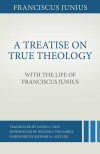
Franciscus Junius (1545–1602) was an influential pastor and professor during the developmental years of Reformed orthodoxy. As a skilled linguist, biblical exegete, and theologian, Junius shaped the Reformed tradition in profound ways.
Junius’s Treatise on True Theology is a scholastic introduction to the discipline of theology. He reflects on the definition of theology, where it comes from, and the variety of modes it takes. This book set a lasting pattern for many Reformed theologians in their approach to dogmatics, establishing a benchmark for theological prolegomena for years to come. Accompanying this work is Junius’ autobiography, The Life of Franciscus Junius, which provides an account of the tumultuous days of Junius’ life and the complex circumstances that the Reformed churches faced during the French and Spanish wars of religion. Readers are further aided by Willem van Asselt’s valuable introductory essay, which offers a scholarly perspective on the treatise and on Junius’ life and work in the context of the rise of Reformed scholasticism and orthodoxy.
[Junius’] influence on the Reformed tradition has been profound, even if not all Reformed folk are aware of it. Now, English readers will be able to see for themselves why that was. This work, with Willem van Asselt’s introduction and Junius’ moving and delightful autobiography, is a most valuable source for the continuing recovery of the Reformed tradition and a window into the theology and piety of classic Reformed theology.
—R. Scott Clark, professor of church history and historical theology, Westminster Seminary California
Franciscus Junius (1545–1602) taught theology at the Casimirianum Neustadt, the University of Heidelberg, and the University of Leiden.
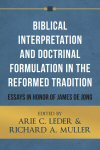
The Reformed tradition is characterized by a rigorous commitment to theological formulation, yet it is equally known for its commitment the authority of God’s Word in the Christian life. While these two commitments are commonly acknowledged, the path from biblical interpretation to doctrinal formulation is often overlooked. Examining a diverse group of thinkers across the chronological and international spectrum of the Reformed tradition, this book demonstrates the depth and intricacies involved in the tasks of exegesis and dogmatic construction, the ways they intersect, and the effect it has on the church.
This festschrift is a great exception to the rule that such volumes are often of little interest to any but the one being honored. On the contrary, here is a collection of scholarly essays with a clear focus that actually makes a significant contribution to our understanding of the ways in which theologians have connected exegesis and doctrinal formulation. Leder and Muller have put together a volume that not only honors a significant figure in Reformed theological education but also that increases our knowledge of the field.
—Carl R. Trueman, Paul Woolley Professor of Church History, Westminster Theological Seminary, Philadelphia
Many are familiar with the precision and nuance that marks early modern Reformed theology, but few recognize that the same care and precision characterize the exegesis of the theologians of this period. This book sheds much-needed light upon the exegetical and theological labors of historic Reformed theology. Anyone—pastors, scholars, seminarians, and laymen—who wants to learn from the insight and wisdom of great Reformed exegetes and theologians should read this book.
—J.V. Fesko, academic dean and professor of systematic and historical theology, Westminster Seminary California
Arie C. Leder is the Martin J. Wyngaarden Senior Professor in Old Testament Studies at Calvin Theological Seminary and a research associate at the University of the Free State in Bloemfontein, South Africa.
Richard A. Muller is the P.J. Zondervan Professor of Historical Theology at Calvin Theological Seminary in Grand Rapids, Michigan.
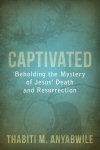
The Bible implores us to take a long look at Jesus, forcefully beckoning us to “come and see” through profound questions connected with Jesus’ death and resurrection. These questions drive us to consider not just the events themselves but also their meaning as we take a long look beneath the surface and find more of the never-ending treasures of Christ. In Captivated, Thabiti Anyabwile invites you to set aside your early lessons on politeness and stare into the mystery of the cross and empty tomb.
This little book is a wonderful guide for those who would like to ‘stare’ for a while at the meaning of Christ’s suffering and resurrection for his people. It is a great resource both for new believers wanting to learn more about the crucifixion as well as long-time saints who want a fresh perspective on familiar events. Be prepared to understand your Bible better and love Jesus more after reading Captivated!
—Mike McKinley, senior pastor, Sterling Park Baptist Church, Sterling, VA
Thabiti M. Anyabwile is senior pastor of First Baptist Church of Grand Cayman and the author of numerous books, including What Is a Healthy Church Member? and Finding Faithful Elders and Deacons. He serves as a council member with the Gospel Coalition, is a lead writer for 9Marks Ministries, and regularly blogs at Pure Church, hosted by the Gospel Coalition.
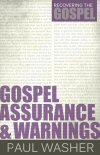
It should come as no surprise that misunderstandings about the gospel message and the nature of true conversion result in a problem with genuine assurance of salvation. A pseudo-gospel of “easy believism” has led many into careless presumption, and a poor understanding of salvation has abandoned tender consciences to near spiritual despair. In Gospel Assurance and Warnings, Paul Washer shines the light of gospel hope as he cautions against the dangers of making an empty profession of faith. Examining this question using 1 John, Washer carefully explains from Scripture the basis for establishing and maintaining a sound assurance of faith.
Just as I would want my children to know for certain they are mine, God wants his children to know that they are his. Washer has provided a great and thorough resource for those wanting to plumb the depths of the question ‘Am I really saved?’ and to teach it to others. This book is loaded with scriptural analysis and pastoral advice. It is a necessary book for the library of anyone entrusted with the care of souls.
—J.D. Greear, author, Stop Asking Jesus into Your Heart: How to Know for Sure You Are Saved
Paul Washer has given us a tremendously helpful tool to seek solid assurance that we are saved from sin by God’s grace. The Word of God is like a mirror for self-examination. The Epistle of First John particularly helps us examine ourselves to see if we are in the faith. Washer applies 1 John in a masterful way to this question, explaining a dozen marks of saving grace in the soul. At the same time, this book does not encourage us to rest on our past experiences but to press forward in spiritual growth in dependence upon the Spirit of Christ. Here is sweet help for God’s children struggling to enjoy assurance of their Father’s forgiveness and acceptance. And here is a sober warning to the self-deceived. May God use this book for His glory to the comfort of his people and the conversion of lost sinners.
—Joel R. Beeke, president, Puritan Reformed Theological Seminary, Grand Rapids, MI
Paul Washer was a missionary in Peru for ten years, during which time he founded the HeartCry Missionary Society to support Peruvian church planters. Paul now serves as one of the laborers with the HeartCry Missionary Society.

Our Lord has given Psalms, the songbook of the Bible, for the benefit of the church. But for many people, Psalms’ contents are mysterious because they no longer have a place of prominence in the church’s worship. Author J.V. Fesko hopes to awaken the church to the majesty, beauty, and splendor of Psalms through a devotional exploration of Psalms 1–8, a “grand Christ hymn,” in which David, as the suffering king, prefigures the king of kings, Jesus Christ. To encourage readers to come to a greater appreciation for Psalms, the author includes with each chapter questions for further reflection and study and a metrical version of each psalm. He also recommends internet resources that provide digital files of the tunes.
Christians know they need instruction not only to pray but also to sing. By tracing the narrative of Christ in the opening eight psalms of the Psalter, this book helps me pray while I sing and sing while I pray. I learn not only to hear Christ in each psalm but I also begin to sing under the aegis of Christ, the chief musician. Those who have sung these psalms from their earliest days as well as those who have joined the Psalter choir only recently will find, with the Spirit’s blessing, deeper and fuller sound.
—Gerald M. Bilkes, professor of New Testament and biblical theology, Puritan Reformed Theological Seminary
The psalms are beloved by Christians everywhere, yet their historical context and intended meaning are little known today. In Songs of a Suffering King, John Fesko skillfully and pastorally unpacks the original setting and theological riches of Psalms 1–8. In doing so, he insightfully explains the Christocentric nature of the Psalms as well as provides practical biblical instruction to all Christian pilgrims who travel the pathway from suffering to glory.
—Jon D. Payne, organizing pastor, Christ Church Presbyterian, Charleston, SC
J.V. Fesko is an ordained minister in the Orthodox Presbyterian Church, and is also academic dean and associate professor of systematic theology at Westminster Seminary California.

When the seed of life is sown in their hearts, God’s people grow up beautifully and gloriously. Taking up this botanical analogy, The Beauty and Glory of Christian Living opens by discussing the divine roots of the Christian life in being united to Christ in faith, being sanctified by the Holy Spirit, becoming spiritually minded, and living by the means of grace. It then explores how our Christian lives branch out to influence our families, our workplaces, and the world. Finally, a series of chapters deal with weathering the storms of life, when we are pelted with affliction, sexual temptation, negative thought patterns, hard times, sickness, and death. In all of this, we see a faithful God who causes his people to flourish for his glory.
Contributors include Michael Barrett, Ian Hamilton, John Tweeddale, Joel Beeke, William VanDoodewaard, Brian Najapfour, Josh Dear, Gerald Bilkes, Brian Croft, and David Murray.
There is something magnetic about these addresses as they present the attractiveness of the Christian life. They remind me of a definitive time in my life 60 years ago when I first read Dr. Lloyd-Jones’ Studies in the Sermon on the Mount. I was gripped with the loveliness of living a holy life. How beautiful is the life of poverty of spirit, mourning for sin, hungering and thirsting for righteousness, purity of heart, and being a peacemaker. This book has the same impact.
—Geoffrey Thomas, pastor, Alfred Place Baptist Church, Aberystwyth, Wales
The Beauty and Glory of Christian Living is a storehouse of spiritual riches for all who desire to experience the fullness of Jesus Christ. The topics covered in these pages are well chosen, carefully addressed, and comprise a treasury of truth for every Christian. Get alone with God and read the book. You will be greatly helped in your growth in godliness.
—Steven J. Lawson, president, OnePassion Ministries, Dallas, TX
Joel R. Beeke is president and professor of systematic theology and homiletics at Puritan Reformed Theological Seminary in Grand Rapids, Michigan. He also serves as a pastor of the Heritage Netherlands Reformed Congregation in Grand Rapids, and as editorial director of Reformation Heritage Books.
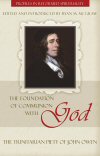
The Foundation of Communion with God introduces readers to the Trinitarian piety of John Owen (1616–1683). Ryan McGraw’s introduction to Owen sketches the major events of this important theologian’s life and shows how his circumstances shaped his thought on the themes of the Trinity and public worship. The second part of the book presents 41 brief selections from Owen’s writings that trace his thoughts on knowing God as triune, on Scripture and worship, on heavenly-mindedness, and on covenant and the church. Appendixes provide readers with a chronological list of Owen’s writings and a guide to them for those who wish to delve deeper into this great theologian’s thoughts.
Imagine being invited to a feast prepared by a great chef, but you have no experience with exquisite foods. Now, someone trained in the culinary arts wants you to appreciate what is before you. He explains the various dishes and then brings you a sample of each to whet your appetite. By the end, you are satisfied, yet hungry for more. This is what we have here, thanks to Ryan McGraw, who has ably introduced and edited this anthology of insights from John Owen’s many volumes.
—Kelly M. Kapic, author, Communion with God: The Divine and Human in the Theology of John Owen
If the very sight of a single 600-page volume of John Owen’s works is daunting or produces a sense of (false) guilt because page-long paragraphs discourage you, then here is the book for you— ‘bite-size’ Owen without being ‘Owen-lite.’ Dr. Ryan McGraw proves to be one of the best kinds of experts (he is one on John Owen): he shows us the heart of the matter. In the case of these pages that means both edification and pleasure rolled into one.
—Sinclair B. Ferguson, author, John Owen on the Christian Life
Ryan M. McGraw is pastor of First Orthodox Presbyterian Church in Sunnyvale, California and a research associate at the University of the Free State. He is also adjunct professor of systematic theology at Greenville Presbyterian Theological Seminary.
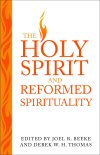
By the Spirit the Word was revealed and written. By the Spirit the Word became flesh and dwelt among us. By the Spirit the Word roots itself in the hearts of sinners and produces fruit. Calvin recognized long ago that the Holy Spirit is the bond of union between believers and Christ. Jonathan Edwards said that the Spirit is the sum of all Christ bought for his people with his precious blood. How precious then is the Spirit, and how important to know him and his ways!
In this book—a festschrift prepared in tribute to Geoffrey Thomas—a team of pastor-theologians uncover the rich biblical teachings about the work of the Holy Spirit. How was the Spirit involved in the human life of Jesus Christ? What is a spiritual person? How does the Spirit open the mind of sinners to trust in Christ? What does it mean to serve God in the power of the Spirit? How does the Spirit’s sovereign work relate to our responsibility in evangelism? These questions and more are addressed in this book. Contributors include Michael A.G. Haykin, Iain Campbell, Fred Malone, Sinclair B. Ferguson, and John J. Murray.
Geoffrey Thomas is known and respected far and wide for his love for the doctrines of grace and warm-heartedness as a pastor. I am grateful to have known him over the years and to be invited now to commend this festschrift with its helpful essays illustrating the importance of the Holy Spirit’s work in saving sinners, in promoting their holiness and spiritual growth, and in supplying biblical preaching past and present.
—Maurice Roberts, emeritus minister, Free Church of Scotland (Continuing)
Geoff Thomas is a Reformed statesman—one of the remarkable figures in the modern church who is truly committed to Reformed ecumenicity. For that reason alone, this tribute is appropriate. You will note that men from a number of church backgrounds (both credo-baptist and paedo-baptist) have contributed to this birthday present. Those readers who know Geoff have found much pleasure and edification in his company, and all who read these articles will find the same.
—Joseph Pipa, president, Greenville Presbyterian Theological Seminary
What better way to give thanks to God for the gracious work of the Holy Spirit in and through a dear father and brother in Christ than by directing hearts and minds to grow in delight in and reverence for the Holy Spirit? This diverse collection of essays challenges us to search the Scriptures to know the Spirit, see His work, and stand in wonder and worship before the triune God.
—William VanDoodewaard, associate professor of church history, Puritan Reformed Theological Seminary
Joel R. Beeke is president and professor of systematic theology and homiletics at Puritan Reformed Theological Seminary in Grand Rapids, Michigan. He also serves as a pastor of the Heritage Netherlands Reformed Congregation in Grand Rapids, and as editorial director of Reformation Heritage Books. He is the author of numerous books including Living for God’s Glory: An Introduction to Calvinism.
Derek Thomas is the John E. Richards Professor of Systematic and Practical Theology at Reformed Theological Seminary and minister of teaching at First Presbyterian Church in Jackson, Miss. He is the author of The Storm Breaks: Job Simply Explained, Calvin’s Teaching on Job: Proclaiming the Incomprehensible God, and a contributor to Tabletalk magazine.
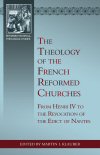
The Theology of the French Reformed Churches introduces us to the Huguenots of the seventeenth century. The period was an unusual one in which France boasted two state religions, Roman Catholic and Protestant, due to the protections afforded the latter by the Edict of Nantes in 1598. In this book, Martin I. Klauber and his team of scholars survey the development of and difficulties facing the early French Reformed tradition as well as the ecclesiastical, theological, and political challenges it faced during the seventeenth century. They also investigate the important contributions made by some of its most significant theologians: Moïse Amyraut, Pierre du Moulin, Jean Daillé, Andreas Rivetus, Charles Drelincourt, Claude Pajon, Jean Claude, and Pierre Jurieu. The theologians of the seventeenth-century French Reformed churches displayed a theological richness rarely remembered even among Reformed believers in the centuries following their labor, and this volume resurrects some of their vitality for a new audience.
Aside from the Wars of Religion and the Revocation of the Edict of Nantes, French Protestantism is largely ignored in most discussions of early modern history. This important book will help fill that void. The collected essays by many leading scholars highlight the theological contributions and historical travails of the seventeenth-century Huguenots, allowing them to resume their rightful place in a pivotal century in European history.
—Glenn S. Sunshine, professor of history, Central Connecticut State University
This most welcome collection of essays, authored by an impressive team of leading scholars, goes to the heart of the Huguenot experience during the increasingly troubled seventeenth century. The initial chapters set the context with lucidity and precision. Subsequent contributions offer a superb exploration of the thought and influence of eight celebrated French Reformed theologians. Professor Klauber and his colleagues have provided an encompassing, informative, and absorbing assessment of Reformed theological positions and their elaboration during a critical era in the history of French Protestantism.
—Raymond A. Mentzer, Daniel J. Krumm Family Chair in Reformation Studies, University of Iowa
Martin I. Klauber is an affiliate professor of church history at Trinity Evangelical Divinity School.

The Works of William Perkins fills a major gap in Reformed and Puritan theology. Though Perkins is best known today for his writings on predestination, he also wrote prolifically on many subjects. However, his complete works have not been in print since the mid-seventeenth century. This volume, the first of a projected 10-volume set, contains three of Perkins’s treatises.
A Digest or Harmony of the Books of the Old and New Testament, offers a synopsis of the Bible that relates sacred history to the chronology of the world. Dating God’s creation of the universe in 3967 BC, Perkins develops his overview of redemptive history that culminates in the final judgment. The second treatise, The Combat between Christ and the Devil Displayed, expounds Matthew 4:1–11, showing how Jesus’ temptation in the wilderness set him up to serve as the second Adam; reveals how the devil assaults the church so that we might be better prepared to resist his temptations; and equipped Christ to be a sympathetic high priest to those who are tempted. The third and most significant treatise is A Godly and Learned Exposition upon Christ’s Sermon in the Mount, in which Perkins explores the Sermon on the Mount as key to unlocking the meaning of Scripture in its entirety, suggests that his understanding of what Christ declares in Matthew 5–7 was pivotal to the development of his theology and piety.
Perkins was justly esteemed by his contemporaries as a master in theology.
On the broad shoulders of William Perkins, epoch-making pioneer, stood the entire school of seventeenth-century Puritan pastors and divines, yet the Puritan reprint industry has steadily bypassed him. Now, however, he begins to reappear, admirably edited, and at last this yawning gap is being filled. Profound thanks to the publisher and heartfelt praise to God have become due.
—J.I. Packer, Board of Governors’ Professor of Theology, Regent College
There was no more important leader in the Puritan movement than William Perkins. To see his works reprinted in a reader-friendly format and with state-of-the-art critical apparatus as a bonus seems too good to be true. This project is a landmark event for both Reformation scholarship and the spiritual edification of Christians.
—Leland Ryken, author, Worldly Saints: The Puritans as They Really Were
Without a doubt, the Puritans were theological titans. The Puritan theological tradition did not emerge out of a vacuum. It was shaped by leaders and theologians who set the trajectory of the movement and shaped its commitments. William Perkins was one of those men. Perkins’s contribution to Puritan theology is inestimable, and this new reprint of his collected works is a much-awaited addition to all who are still shaped and influenced by the Puritans and their commitment to the centrality of the grace of God found only in Jesus Christ. Even now, every true gospel minister stands in debt to Perkins, and in his shadow.
—R. Albert Mohler Jr., president, The Southern Baptist Theological Seminary
William Perkins was a most remarkable Christian. In his relatively short life he was a great preacher, pastor, and theologian. His prolific writings were foundational to the whole English Puritan enterprise and a profound influence beyond his own time and borders. His works have become rare, and their republication must be a source of real joy and blessing to all serious Christians. Perkins is the first Puritan we should read.
—W. Robert Godfrey, president, Westminster Seminary California
William Perkins (1558–1602) earned his BA in 1581 and a MA in 1584 from Christ’s College in Cambridge. From 1584 until his death, Perkins served as lecturer, or preacher, at Great St. Andrew’s Church, Cambridge, an influential pulpit across the street from Christ’s College. He also served as a teaching fellow at Christ’s College, catechized students at Corpus Christi College on Thursday afternoons, and worked as a spiritual counselor on Sunday afternoons. His writings were translated into several European languages and greatly influenced British and American Reformed theology, the Dutch Further Reformation, and European Pietism.
J. Stephen Yuille is preaching-teaching pastor of Grace Community Church in Glen Rose, Texas. He is also the director of Baptist studies at Redeemer Seminary in Dallas, Texas, and the author of Living Blessedly Forever: The Sermon on the Mount and the Puritan Piety of William Perkins.
Reviews
0 ratings

Cris Dickason
6/30/2017
Some of these titles are are much too valuable to locked into a bundle. Please negotiate for the ability to offer these as individdual titles. Junius, Treatise on True Theology (and that whole series) should be published/sold through Logos, no strings (bundles) attached! Same would be true of the Works of Perkins!